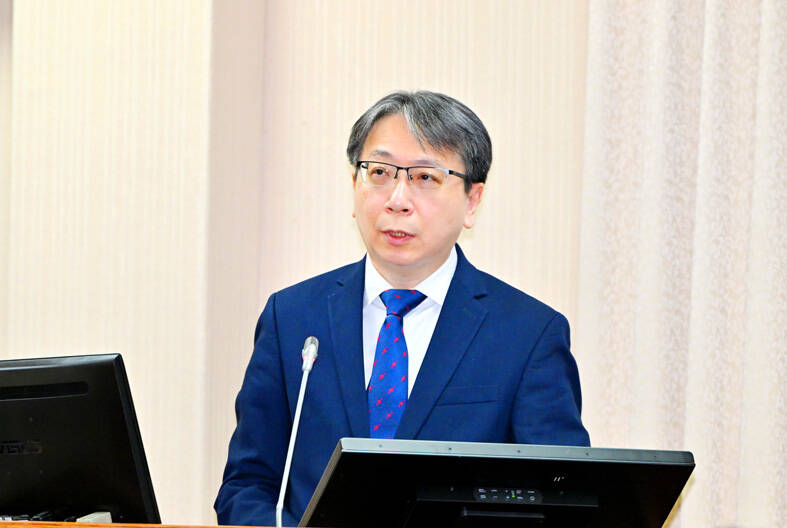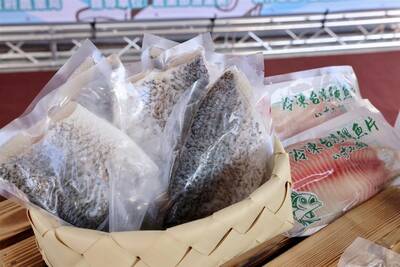The Ministry of Justice Investigation Bureau has established a third-party review committee to investigate the possible infiltration of Taiwanese organizations by the Chinese Communist Party (CCP), sources said last week.
The bureau first proposed the formation of the committee two years ago, saying that the CCP was diversifying its tactics to infiltrate Taiwan, making it harder to identify the source of such efforts and to make arrests, sources said.
“The CCP is increasingly using Taiwan’s democracy and freedoms to its advantage in infiltrating Taiwan’s organizations,” bureau Director-General Chen Pai-li (陳白立) said on July 4 while speaking to lawmakers at the Legislative Yuan.

Photo: Tien Yu-hua, Taipei Times
Citing examples of the CCP’s methods, Chen said it uses Taiwanese to help it recruit people and to spy in Taiwan; engages in actions that influence the outcome of Taiwan’s elections and cognitive warfare to undermine the credibility of the ruling Democratic Progressive Party; initiates cyberattacks on sensitive systems in Taiwan; poaches talent and steals industry secrets from Taiwanese companies; manipulates Taiwanese under the guise of engaging in cultural exchanges; and provides benefits and concessions to Taiwanese who act on its behalf.
However, when cases go to trial in Taiwan, they often result in acquittals, a source said on Sunday last week.
The bureau has been reviewing the cases and trying to determine whether the acquittals are due to judges’ misunderstanding of the cases or a lack of evidence for prosecution, the source said.
“It’s usually hard to prove that the CCP is behind spying activity. The defendant would normally deny the connection, and of course we cannot ask China for evidence,” they said.
Tying the cash flow in such cases to China is also difficult, as the CCP seeks conceal its involvement by moving money through underground exchanges, virtual currencies and other methods that are difficult to trace, they said.
The bureau has sought to solve the issue by establishing a third-party case review committee with the National Security Bureau, the Mainland Affairs Council and the Military Intelligence Bureau, among other agencies, they said.
Senior prosecutors believe that the Anti-Infiltration Act (反滲透法) does not need to be revised to pursue spying cases, but rather that prosecutors need clearer targets, such as those set during election periods, which prohibit certain exchanges with China, the source said.
“If the Ministry of Justice, the Central Election Commission and other government agencies set clear targets like that, then we know what to go after,” they said.
To facilitate Taiwanese exchanges with people in China that do not contravene the law, authorities should set clear timelines for such exchanges ahead of elections and should encourage Taiwanese to reject invitations from China that would conflict with regulations, Taipei prosecutor Lin Ta (林達) said.
Different timelines for exchanges should also be set according to the scale of the election, he said.
For example, restrictions are in place 10 months prior to presidential elections, he added.
“I believe that as long as the laws are clear, people will be less likely to contravene them,” he said.

Taiwan's Vice President Hsiao Bi-khim (蕭美琴) said Saturday that she would not be intimidated by the Chinese Communist Party (CCP), following reports that Chinese agents planned to ram her car during a visit to the Czech Republic last year. "I had a great visit to Prague & thank the Czech authorities for their hospitality & ensuring my safety," Hsiao said on social media platform X. "The CCP's unlawful activities will NOT intimidate me from voicing Taiwan's interests in the international community," she wrote. Hsiao visited the Czech Republic on March 18 last year as vice president-elect and met with Czech Senate leadership, including

There have been clear signs of Chinese Communist Party (CCP) attempts to interfere in the nationwide recall vote on July 26 in support of Chinese Nationalist Party (KMT) legislators facing recall, an unnamed government official said, warning about possible further actions. The CCP is actively involved in Taiwanese politics, and interference in the recall vote is to be expected, with multiple Chinese state media and TAO attempts to discredit the Democratic Progressive Party (DPP) and undermine public support of their recall movement, the official said. This interference includes a smear campaign initiated this month by a pro-Beijing Hong Kong news outlet against

A week-long exhibition on modern Tibetan history and the Dalai Lama’s global advocacy opened yesterday in Taipei, featuring quotes and artworks highlighting human rights and China’s ongoing repression of Tibetans, Hong Kongers and Uighurs. The exhibition, the first organized by the Human Rights Network for Tibet and Taiwan (HRNTT), is titled “From the Snowy Ridges to the Ocean of Wisdom.” “It would be impossible for Tibetans inside Tibet to hold an exhibition like this — we can do it. because we live in a free and democratic country,” HRNTT secretary-general Tashi Tsering said. Tashi Tsering, a Taiwan-based Tibetan who has never

A first shipment of five tons of Taiwan tilapia was sent from Tainan to Singapore on Wednesday, following an order valued at NT$600,000 (US$20,500) placed with a company in the city. The products, including frozen whole fish and pre- cooked fish belly, were dispatched from Jiangjun Fishing Harbor, where a new aquatic processing and logistics center is under construction. At the launch, Tainan Mayor Huang Wei-che (黃偉哲) called the move a “breakthrough,” marking Taiwan’s expansion into the Singaporean tilapia market. Taiwan’s tilapia exports have traditionally focused on the United States, Canada, and the Middle East, Huang said, adding that the new foothold in